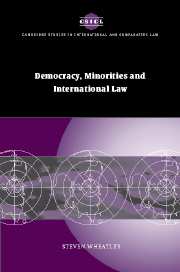Book contents
- Frontmatter
- Contents
- Acknowledgments
- Table of cases
- Table of treaties
- Table of UN resolutions and OSCE and other documents
- List of abbreviations
- Introduction
- 1 The rights of minorities
- 2 The self-determination of peoples
- 3 Democracy
- Conclusion: the accommodation of diversity
- Index
- CAMBRIDGE STUDIES IN INTERNATIONAL AND COMPARATIVE LAW
Conclusion: the accommodation of diversity
Published online by Cambridge University Press: 27 October 2009
- Frontmatter
- Contents
- Acknowledgments
- Table of cases
- Table of treaties
- Table of UN resolutions and OSCE and other documents
- List of abbreviations
- Introduction
- 1 The rights of minorities
- 2 The self-determination of peoples
- 3 Democracy
- Conclusion: the accommodation of diversity
- Index
- CAMBRIDGE STUDIES IN INTERNATIONAL AND COMPARATIVE LAW
Summary
This work has examined the relevance of international law to cultural disputes in democratic States. It has shown that minorities, national minorities, indigenous peoples and peoples are defined primarily by their cultural differences to a dominant/majority culture and by their political demands. International law recognises a right of persons belonging to minorities to enjoy their own culture, to profess and practise their own religion, or to use their own language, and a right of peoples to self-determination. The principles of cultural security and self-determination are recognised, but without detailed rules being elaborated as to how those principles are to be put into effect. According to Antonio Cassese, the adoption of principles rather than rules is ‘the expression and result of conflicting views of States on matters of crucial importance’. When States cannot agree on ‘definite and specific standards of behaviour’ but require some ‘basic guideline for their conduct’, they formulate legal principles rather than legal rules.
States policies concerning ethno-cultural groups will emerge through domestic decision-making procedures, in accordance with the principles recognised by the international community: cultural security for minorities and self-determination for peoples. In democratic States, these policies will be adopted in accordance with the principles of democracy: popular sovereignty and political equality. Legislative and other measures will enjoy limited legitimacy where those who will be subject to the law have been excluded from the process of democratic deliberation and decision-making.
- Type
- Chapter
- Information
- Democracy, Minorities and International Law , pp. 191 - 198Publisher: Cambridge University PressPrint publication year: 2005



